人教新目标版英语七下Unit 4《Don’t eat in class》(Section B 1a-1d)导学案
人教版新目标七年级英语下册Unit4Don’teatinclass语法篇试题含答案
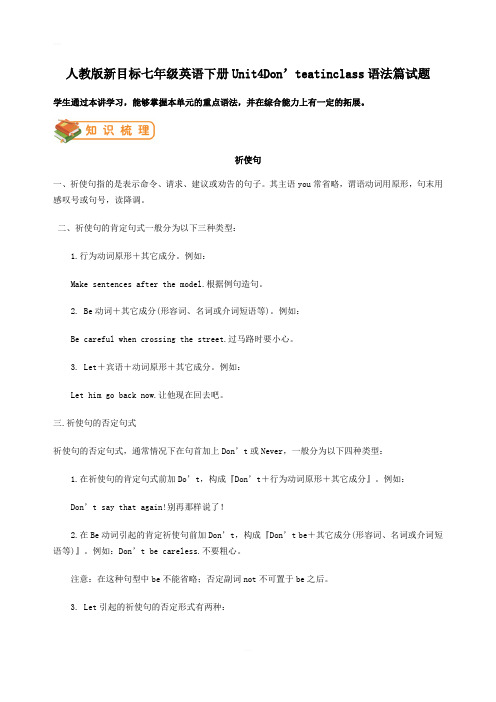
人教版新目标七年级英语下册Unit4Don’teatinclass语法篇试题学生通过本讲学习,能够掌握本单元的重点语法,并在综合能力上有一定的拓展。
祈使句一、祈使句指的是表示命令、请求、建议或劝告的句子。
其主语you常省略,谓语动词用原形,句末用感叹号或句号,读降调。
二、祈使句的肯定句式一般分为以下三种类型:1.行为动词原形+其它成分。
例如:Make sentences after the model.根据例句造句。
2. Be动词+其它成分(形容词、名词或介词短语等)。
例如:Be careful when crossing the street.过马路时要小心。
3. Let+宾语+动词原形+其它成分。
例如:Let him go back now.让他现在回去吧。
三.祈使句的否定句式祈使句的否定句式,通常情况下在句首加上Don’t或Never,一般分为以下四种类型:1.在祈使句的肯定句式前加Do’t,构成『Don’t+行为动词原形+其它成分』。
例如:Don’t say that again!别再那样说了!2.在Be动词引起的肯定祈使句前加Do n’t,构成『Don’t be+其它成分(形容词、名词或介词短语等)』。
例如:Don’t be careless.不要粗心。
注意:在这种句型中be不能省略;否定副词not不可置于be之后。
3. Let引起的祈使句的否定形式有两种:(1)Let开头的祈使句,如果后面跟第一、第三人称名词或代词的宾格,可在Let前加Don’t,也可在Let后宾格的名词或代词后面加not。
(2)如果以Let’s开头的祈使句,必须在Let’s后加not。
例如:Don’t let me go with her tom orrow. =Let me not go with her tomorrow.不要让我明天跟她一起去。
Let’s not tell her the truth whenever we meet her.无论什么时候我们碰到她,都不要告诉她真相。
七年级英语下册 Unit 4 Don’t eat in class短语、句型、作文汇总 (新版)人教新目标版
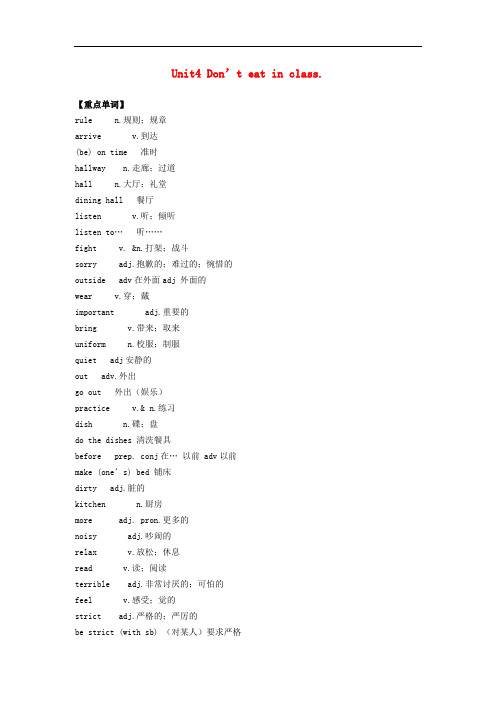
Unit4 Don’t eat in class.【重点单词】rule n.规则;规章arrive v.到达(be) on time 准时hallway n.走廊;过道hall n.大厅;礼堂dining hall 餐厅listen v.听;倾听listen to…听……fight v. &n.打架;战斗sorry adj.抱歉的;难过的;惋惜的outside adv在外面adj 外面的wear v.穿;戴important adj.重要的bring v.带来;取来uniform n.校服;制服quiet adj安静的out adv.外出go out 外出(娱乐)practice v.& n.练习dish n.碟;盘do the dishes 清洗餐具before prep. conj在…以前 adv以前make (one’s) bed 铺床dirty adj.脏的kitchen n.厨房more adj. pron.更多的noisy adj.吵闹的relax v.放松;休息read v.读;阅读terrible adj.非常讨厌的;可怕的feel v.感受;觉的strict adj.严格的;严厉的be strict (with sb) (对某人)要求严格remember v.记住;记起follow v.遵循;跟随follow the rules 遵守规则luck n.幸运;运气keep v.保持;保留hair n.头发;毛发learn v. 学习;学会【重点短语】1. Don’t eat in class 在课堂上2. arrive late for class 上课迟到3. be on time 准时4.in the hallways 在走廊里5.in the dining hall 在餐厅6. listen to music 听音乐7 fight with…与某人打架8.Don’t eat in class. 不要在课堂上吃东西。
人教版七级下英语Unit 4 Dont eat in class单元知识复习总结
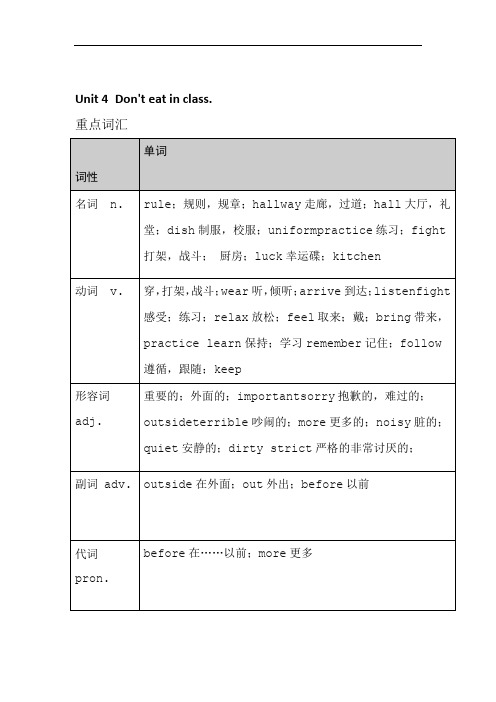
Unit 4Don't eat in class. 重点词汇重点短语Section A1.in class在课堂上2.arrive late for class=be late for class上课迟到3.on time准时4.in the hallways在走廊里5.in the dining hall在餐厅里6.listen to听7.at school在学校8.be late迟到9.music player音乐播放器10.bring...to school 把……带到学校来不得不做have to do.11.12.wear a school uniform穿校服13.be quiet安静Section B14.go out外出15.on school nights在上学期间的晚上16.practice the guitar练吉他17.do the dishes清洗餐具18.make breakfast做早饭19.make one's bed整理床铺20.leave sth.in...把……丢在……里21.read a book看书22.think about考虑23.make rules制订规则24.follow the rules遵守规则25.Good luck!祝好运!26.keep sth.+adj.使……保持……状态重点句型1.Don't eat in class.在课堂上不准吃东西。
2.Don't arrive late for class.You must be on time.不准上课迟到,务必守时。
3.Don't run in the hallways.不准在走廊内乱跑。
4.Don't eat in the classroom.You must in the dining hall.不准在教室里吃东西,务必在餐厅里吃东西。
5.Don't listen to music in class.不准在课堂上听音乐。
人教版英语七年级下册-Unit-4-Don't-eat-in-class-语法解析

2021/2/4
1
6
疑问句: must 提前,回答时注意一二人称的互换。肯定用 must, 否定用needn’t. e.g. --Must I go home now?
-- Yes, you must. -- No, you needn’t.
B: And I must clean my room every Saturday. =?
A: Wow, you do have a lot of rules!
2021Dr. Know, There are too many rules! At 6:00 a.m. my mom says, “Get up now and make your bed!”
too many rules “太多的规定”, 其中too many 用来 修饰可数名词复数rules。 e.g. He has too many friends to meet.
修饰不可数名词时, 要用too much e.g. We have too much work to do.
much too 太……much 用来增强语气。后接形容 词或副词。
What can I do. Dr. Know? Molly Brown, New York
表“看”的单词?
either 也。用于否定句和疑问句中。肯定句中用too 表也。
watch,see,look r,read
2021/2/4
1
13
Dear Molly, I know how you feel. People always tell us, “ Don’t do this!” or “You can’t do that!” But think about it, Molly. There are a lot of things you can do. You can play basketball on weekends. You can watch TV after you read a book. Parents and schools are sometimes strict,
初一七年级英语下册人教版Unit 4 Don't eat in class 单元文化背景资料

一,关于规章规章即指规则章程,是规定出来供特定群体的人们共同遵守的制度或章程。
语言文字中规章随场合(正式或非正式)、人物对象、语体(口语或书面语)等不同表现出极强的得体性特征。
另外,不同文化、阶层的人们对规章的认可也是会产生巨大的差异。
因此,规章又表现出极强的地域性和文化性。
英文里规章在书面体和口语语体的语言形式上存在一定的差距,有的时候这种差异还是显而易见的。
试比较:No smoking.(书面体,正式)Don’t smoke in this area.(书面及口语体,正式及命令)You can’t/mustn’t smoke here,sir.(口语体,非正式)You’d better not smoke here, sir. ( 口语体,非正式)或:Would you mind not smoking here,sir?( 口语体,正式且委婉,带有规劝性)二、英文规章的几种表现形式1 图例形式如人们在道路、公共场所常见的“禁左转弯”'“禁止吸烟”等各种图标。
2. 名词性结构大多由“no”、prohibited、free 和zone等构成。
如以下几种“请勿吸烟”的表达方式:No smoking.Smoking strictly prohibited.Smoke Free Zone3.祈使句结构多见于书面张贴,公众告知性的各类规章制度。
如:Arrive on time for school!!Don’t run and play in the classroom.禁止在教室内追逐、打闹。
4.情态动词结构常见于正式或非正式的口语表达:You can,t leave your bike here,sir•先生,此处不可以停放自行车。
Would you move your bike to the wall, please? 请您将自行车挪到墙那边停放好吗?You must wear your school uniforms to school tomorrow.明天大家务必穿校服到校。
七年级英语下册 Unit 4 Don't eat in class教学 (新版)人教新目标版
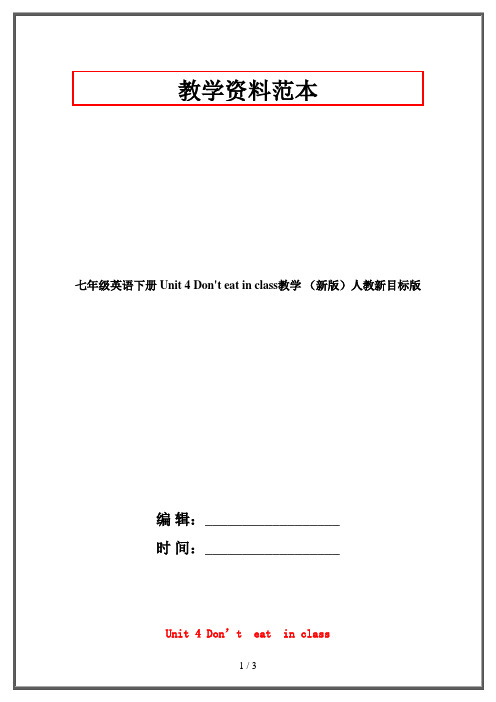
课时4 Section B(2a----2c)【学习目标】:1.掌握2b信的内容和重点短语:too many,too much和much too的区别;be strict with 和be strict in 的区别。
2.能够灵活运用所学短语。
3.情感目标:让学生谈论自己的家规和校规,并且遵守合理的规章制度。
【教学重难点】:1.掌握2b信的内容及重点短语。
2.掌握too many,too much和much too的区别;be strict with和be str ict in 的区别。
【学情分析】:“Go For It”是一套富有生活情趣,形式灵活,极具人文性的教材。
七年级下册“Unit 4 Don’t eat in class.”这一单元的中心话题是“rules”,谈论自己家里和学校的规章制度。
本课时以任务型教学为主线,着重培养学生获得英语基础知识和阅读的能力。
学习英语四项技能中,学生一般在说的方面最差,主要由于说的太少,可是学生不但课下不愿意说英语,课上也不愿意开口。
因此,如何鼓励他们多说和灵活运用所学短语以及提高他们的阅读能力,特别是在课上如何多说英语是摆在我们面前的课题。
尤其是对于英语基础特别差的孩子来说,更要培养他们的自信。
【Teaching procedures】:Step 1. Let’s review.(复习)Review some phrases about this class.Step 2. Check the guiding paper and correct some mistakes.(反馈导学案并纠错)Step 3.Finish the guiding paper:(学生合作探究-展示-点评-质疑)1.探究一:too many PK too much, much too.2.探究二:be strict with PK be strict inStep 4.Read the letter (23页,2b),then answer the questions.Step 5.Do some exercises in class.(课堂练习,检测对本堂课学习内容的掌握)Step 6.Summary.(课堂总结)Let students make a s ummary about this class.Step 7.Blackboard design:(板书设计)Unit 4 Don’t eat in class.(section B 2a---2c)Language points:1.too many +可数名词的复数too much +不可数名词。
人教版初中英语七年级下册Unit4 Don’t eat in class

拓展
情态动词can的用法
用于疑问句中用来提出要求。例如: Can you...?“请你……好吗?”表示说话 人的请求。 Can I...?“我可以……吗?”用来征求对 方是否允许自己做某事。如在句末加上 please一词就显得更有礼貌了。例如:
He gets to school on time everyday
她及时赶到了医院。
She reach the hospital in time.
be strict with sb.
他爸爸对他很严格。
His father is strict with him.
重点短语
……迟到 arrive(be) late for ……
戴帽子 wear a hat/wear hats
School Rules
Don’t arrive late for class.
School Rules
Don’t run in the hallways.
School Rules
Don’t eat in the classroom.
School Rules
2.祈使句的否定形式是在整个结构之前加 don’t或never。如: Don’t be nervous!你不要紧张!
Practice 将下列祈使句改成否定形式。
肯定祈使句 1. Sit down. 2. Come in. 3. Eat at home. 4. Listen to music outside.
fight with sb. 同某人打架 fight the fire 救火
Explanation
fight 是不及物动词,其后加上with才能接宾 语。fight with sb. 意为“与某人打架”。如: Don’t fight with your sister again. 不要再和 你妹妹打架了。 They are fighting with the enemies bravely. 他们正在勇敢地同敌人战斗。
2024年春七年级英语下册Unit4Don’teatinclass单元分析教案新版人教新目标版

Unit 4 Don't eat inclassSection A本单元以“规章制度”为话题,用祈使句、情态动词can, must, have to谈论班规、校规及家规。
Section A部分通过教室外墙壁张贴校规的形式呈现书面语的规章制度,然后通过听、说、读、写来学习规章制度的表达方法。
Section B部分通过Molly Brown的苦恼,介绍有关“家规”的内容,并引导学生正视“家规、校规”,使他们相识到:Teachers and parents make rules to help us. We have to follow them.1.Don't eat in the classroom.2.We can't arrive late for class.3.We must be on time.4.—Can we wear a hat in class?—Yes, we can./No, we can't.5.We have to clean the classroom.6.We have to follow the rules.1.祈使句的否定句用法 (详见P 语法聚焦)2.情态动词can表示“许可”的用法及have to的句型结构。
Some school rules in America1.If someone bumps into you, say excuse me, even if it was not your fault.别人碰撞到你,不管你有没有错都要说“对不起”。
2.Be positive and enjoy life.要乐观,要享受人生。
3.Live so that you will never have regrets.别让将来有缺憾。
4.No matter the circumstances, always be honest.不管环境如何,肯定要诚恳。
七年级英语下册-Unit-4-Don‘t-eat-in-class教案-(新版)人教新目标版

Unit 12 Don’t eat in class.I.教学设计分析本单元的中心话题是rules,主要语言功能是谈论并制定某些规章制度,如校规、班规和家规。
语言结构为祈使句。
利用情态动词can, must, have to 来谈论一些规章制度。
在Section A里通过活动与图片的配对,引出本部分中关于“学校的规章制度”及否定祈使句。
主要训练学生的听、说、演及其归纳总结的水平。
Section B主要通过一系列的句式进一步训练目标语言,并注意have to与 must, can与can’t的用法。
最后是要能使用所学的知识去制定一定的规则。
New languages:1.- Don’t run in the hallways. Don’t fight.2.-What are the rules? We must be on time for class.3.-Can we eat in the classroom?-No, we can’t, but we can eat in the dining hall.4.-Can we wear a hat in class? Yes, we can./ No, we can’t.5. - Does he have to wear a uniform at school?-Yes, he does. / No, he doesn’t.6. What do you have to do? We have to be quiet in the library.II. 教学学时分配Teaching periods:Period 1: Section A 1a -1cPeriod 2: Section A 2a -2cPeriod 3: Grammar Focus/ 3a -3cPeriod 4: Section B 1b -1fPeriod 5: Section B 2a-3c and self checkPeriod 6: Review Unit 1Unit 4 Don’t eat in class.Section A (1a-1c)1.Master the key words:rules, hallway, classroom, Mrs. fight, school rules.Master the sentences: 1). Don’t eat in class.2).You must be on time.3). Eat in the dining hall.2.Talk about the school rules.3.Listening and speaking skills and communicative competence.4. Encourage students to talk about the rules.5. To help Ss use the target language in natural speech.II. Key points1. Talk about the school rules and the target language.2. Learn to talk about the school rules.3. Imperatives Don’t...Difficult point:1. Talk about the school rules and the target language.2. Learn to talk about the school rules.III. Teaching aidsMultimedia/A tape recorder/A blackboardIV. Teaching proceduresStep1 Leading-inWarming-upT:What’s the woman doing? S: Sh e’s eating.T: Where is she eating? S: Sh e’s eating in class.T:Can you eat in class? S: No, we can’t.T: So please don’t eat in class.(= You can’t eat in class.)…Step 2 Presention1. T: Now, Look at the picture on your textbook. Each of the students is breaking one ofthese rules.Please finish 1a.1. Don’t arrive late for class. You must be on time.2. Don’t run in the hallways.3. Don’t eat in the classroom. You must eat in the dining hall.4. Don’t listen to music in class.5. Don’t fight.2. Listening1). T: Now let’s listen! What rules are these students breaking? Write the numbers after names?Peter ______ Amy ______ Mike ______2). Check the answers:3). Listen again and complete the conversation.Ms. Clark: Hey, Peter. You know the rules. Don’t _________________.Peter: Sorry, Ms. Clark.Mr. Smith: Amy, don’t _______________________.Amy: Oh, sorry, Mr. Smith.Mr. Smit h: Hey, Mike, don’t ______________ in class. Mike!Boy: He can’t hear you, Mr. Smith.Step3 ConsolidationPair workS.A is a new student. S.B is telling S.A about the school rules.Ask students to practice the conversation and make their own conversations.Ss work in pairs and practice saying the school rules.A: What are the rules?B: Well, we can’t arrive late for class. We must be on time.…Step 4 Summary1. Words: rules, arrive, late, hall, dinning hall, listen, listen to, fight, sorry Phrases: on time listen to… arrive/be late forSentences: 1. Don’t arrive late for class.You must be on time.2. Don’t run in the hallways.3. Don’t eat in the classroom. You must eat in the dining hall.4. Don’t listen to music in class.5. Don’t fight.2. Assign homework:1). Copy the new words (5E, 1C).2). Try to remember the words and expressions and use them freely.3). Write the rules in your school with“Don’t …. We can’t.... We must...”. V. Blackboard designUnit 4 Don’t eat in class.Section A1. Don’t arrive late for class.You must be on time.2. Don’t run in the hallways.3. Don’t eat in the classroom. You must eat in the d ining hall.4. Don’t listen to music in cla ss.5. Don’t fight.Teaching reflection:。
人教版新目标英语七年级下册:Unit 4 《Don't eat in class》

Unit4 Don’t eat in class!附参考答案一.单项选择.1.____ late. It’s your first day to work.A. Don’t to beB. Don’t beC. Don’tD. No 2.-______sing! -All right.A. LetB. Let’sC. We let3.When will the train ______?A. arriveB. arrive atC. reachD. arrive in4.I ______ but I _______ nothing.A. listened ; heardB. listened; hearC. heard; heardD. heard; listened5.The girl ______ the red dress is Jill Green.A. withB. wearC. put onD. in6.-Do you have an eraser?-______. I have _______ eraser.A. No; notB. Not; noC. No; noD. Not; not7. Mary usually _____ her dog at weekend.A. walkB. takesC. go withD. walks8. Don’t ______ bed by 9 o’clock.A. goB. inC. be inD. go in9. We can’t go out _______ school nights.A. atB. inC. onD. by10. He can’t meet his friends tonight because he _______ do homework.A. has toB. needC. have toD. don’t have to11. It’s very warm. You ______ to wear the coat.A. mustB. d on’t have toC. have toD. mustn’t12. Don’t go into the classroom _______ the teacher.A. withB. togetherC. withoutD. with not13. He can’t _______, but he often _______ to the beach and play.A. swimming, goB. swim, goesC. swims, goesD.swim, go14. Does she always wear _______?A. uniformB. sneakerC. a uniformD. a sneaker15. There are ________ rules in our class.A. many tooB. too muchC. much tooD. too many16. Tom never ________ fun at home.A. have muchB. has anyC. have anyD. has many二.句型转换。
新人教版英语七年级下册教案 Unit 4 Don’t eat in class.

Your mother doesn’t have to do that now.你妈妈现在不必做那件事情了。
You mustn’t play football in the street after class.放学后,你们一定不要在街上踢足球。
7. be sure 8. for two hours
9. be strict with sb. 10. art teacher
三.课文解析
Section A
1.Don’t arrive late for class.不要上课迟到。
(1)本句是一个否定的祈使句,祈使句是以动词原形开头的,表示命令或请求的句子。其否定句是在动词原形之前加don’t。如:
Do be quiet.务必安静。
3用客气的语气表示祈使句时,可在句首或句尾加上please,但如果在句尾加please,那么在please之前一定要加上一个逗号“,”。如:Keep quiet, please.请保持安静。
4祈使句中如果有唤语,一定要用逗号“,”将唤语与其他的内容隔开,唤语置于句首或句尾。如:
have / has to表示由于外部环境、情况、习惯等的客观需要,相当于汉语中的“不得不”。
如:You must do your homewor k now.现在你必须做你的功课。
He has to study late into the night to pass the exam.为了通过考试,他不得不学习到深夜。
We have to work hard.我们得努力工作。
I think he may have to help his dad in the garden.我想他可能不得不在花园里帮他爸爸。
2020七年级英语下册 Unit 4 Don’t eat in class短语、语法知识点汇总 (新版)人教新目标版
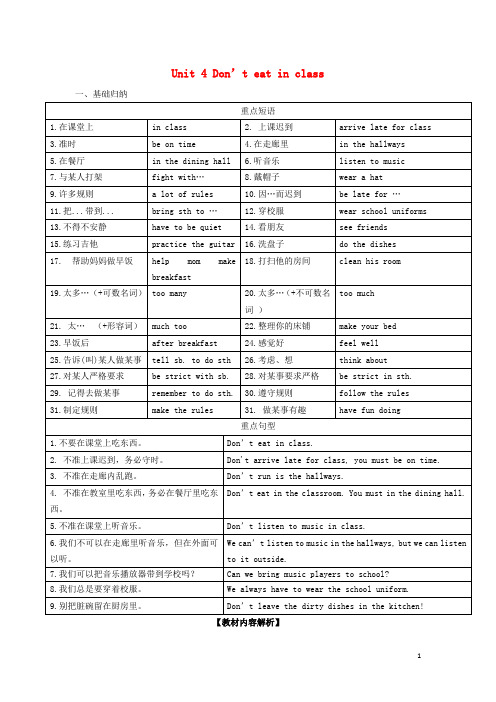
Unit 4 Don’t eat in class 一、基础归纳【教材内容解析】Section A1.Don’t arrive late for class. (P. 19)arrive作不及物动词,表示“到达”,接宾语时,需要加上介词in或者at。
When did you arrive?We are arriving at the station at two o’clock.【拓展】reach表示“到达”时,是及物动词,后面直接接表示地点的名词作宾语。
另外两个表示“到达”的动词(get和arrive)都是不及物动词,get to+地点;arrive in/at+地点。
After a long way, they reached/got to/arrived at the top of the mountain finally.2.You must be on time. (P. 19)on time用作固定短语,表示“准时、按时”,in time表示“及时”。
The train arrives on time.The ambulance(救护车) arrives in time.3.Don’t listen to music in class. (P. 19)listen用作不及物动词,表示听的动作,后接宾语时,需要加上介词to,hear强调听的结果,表示“听到”。
This girl likes to listen to music.Can you hear anything?4.Don’t fight. (P. 19)fight此处用作动词,意为“打架”,fight with sb.意为“与某人打架”。
Why do you sometimes fight with others?5.listen to music outside (P. 20)outside表示“在外边”,反义词为inside“在……里面”。
新版新目标英语七年级下unit4__Don't_eat_in_class课件
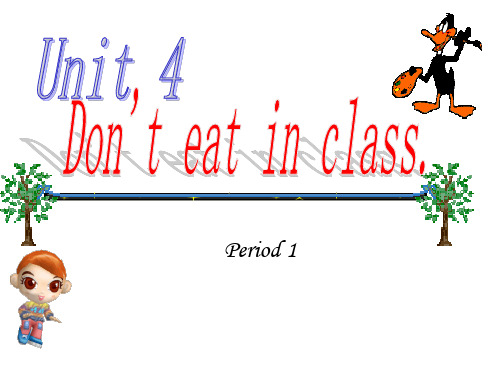
Make rules for your family
Discuss with your parents and
make rules for your family. (和父母讨 论,一起制定家里的规则).
Don’t arrive late for class.
Don’t run in the hallways.
Sorry, Ms Clark.
hallway
Can you fight in school?No, we can’t.
Don’t fight .
1a Write the number of the rule next to the students.
Don’t eat in class.
Can we listen to music in class? No, we can’t.
Don’t listen to music in class.
7:15
What are the rules? Well, we can’t arrive late for class.
6._D__o_n_’t__fi_g_h_t.
7. _C_l_e_a_n the classroom after class.
8. Wec_a_n_’_t_p_l_a_y_b_a_s_k_e_t_b_a_ll___in class.
Summate for class. You must be on time. 2. Don’t run in the hallways. 3. Don’t eat in the classroom. You must eat in the
新版新目标英语七年级下unit4--Don't-eat-in-class课件
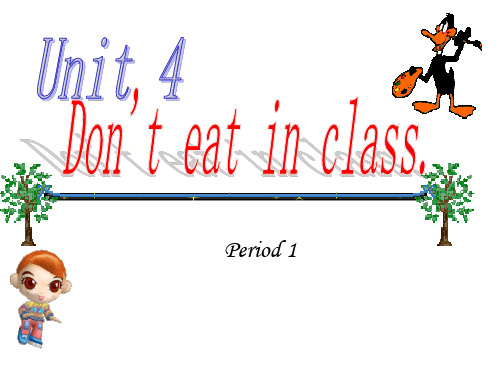
listen to music in class
在班里听音乐
Can we listen to music in class? No, we can’t.
Don’t listen to music in class.
arrive late for class
上课迟到
7:15
Can we arrive late for class? No, we can’t.
must用法举例
wear a uniform 穿校服 You must wear a uniform.
wear a hat 戴帽子 You must wear a hat.
eat in the dining hall 在食堂吃饭
You must eat in the dinning hall.
must 必须 (强调主观)
情
后接动词原形, be动词原形
态
eg. I must go now.
动
You must be quiet.
词 必须 ,不得不(强调客观,不情愿) have to 后接动词原形,be动词原形
eg. You have to go home.
I have to do my homework.
Don’t arrive late for class.
run in the hallways 在走廊上跑
Can we run in the hallways? No, we can’t.
Don’t run in the hallways.
fight
打架
fight with sb. 同某人打架
Can you fight in school? No, we can’t.
人教新目标版英语七下Unit 4《Don’t eat in class》(Period 4)ppt-
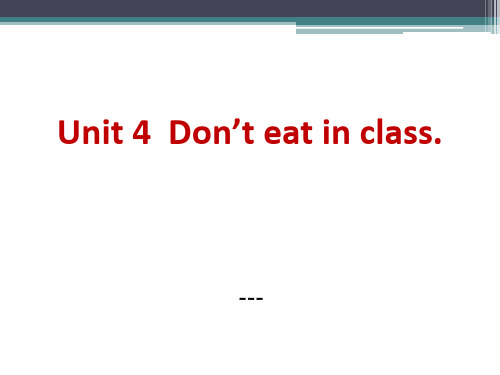
写前指导
二、重点词汇积累。 6. 太多的规则____t_o_o__m_a_n_y__ru__le_s___ 7. 在晚上出去 __g_o_o_u_t__a_t _n_ig_h_t_______ 8. 在学校的夜晚___o__n_s_c_h_o_o_l_n__ig_h_t_s__ 9. 课后__________a_f_t_e_r _c_la_s_s______ 10. 练习英语___p_r_a_c_ti_c_e_E_n__g_li_s_h______ 11. 每天 ______e_v_e_r_y__d_a_y_______ 12. 对我们学习有好处 __i_t’_s_g_o__o_d_f_o_r_o_u_r__s_tu_d_y 13. 为我的梦想而奋斗 _f_ig_h__t _fo_r__o_u_r_d_r_e_a_m_____
have to fight for my dream.
写前指导
一、根据文章内容,完成下列信息卡。
The feeling I have for the school rules
1._N__o_t_h_a__p_p_y_______
The reason we can’t play on 2. __B__e_c_a_u_s_e__i_t’_s___
Unit 4 Don’t eat in class.
---
学习重点&学习目标
【学习重点】 阅读有关文章并将目标语言、短语及句型运用到 写作中。
【学习目标】 学会写一篇关于“规章制度”为话题的文章。
写前指导
School rules I’m not happy. We have too many rules at school. First, we can’t play in the street or go out at night, because it’s dangerous. Second, we can’t play computer games on school nights because it’s bad for our study. Third, after class, we have to do homework and practice English with our classmates every day. It’s boring but it’s good for our study. I never have any fun, but I still
- 1、下载文档前请自行甄别文档内容的完整性,平台不提供额外的编辑、内容补充、找答案等附加服务。
- 2、"仅部分预览"的文档,不可在线预览部分如存在完整性等问题,可反馈申请退款(可完整预览的文档不适用该条件!)。
- 3、如文档侵犯您的权益,请联系客服反馈,我们会尽快为您处理(人工客服工作时间:9:00-18:30)。
Unit 4 Don’t eat in class
学习目标:1. 能够准确流利地朗读文章; 2. 通过不同的阅读方法,掌握文章信息;
重、难点:1.学会运用情态动词must, have to, can等。
2.掌握本课的生词、短语、句型独学准备:1. 试读。
试读文本,用红笔划出文章中的生词,完成随堂笔记;
2. 再读。
利用教材或工具书查看生词的读音和真正含义,再读文本;
3. 大声朗读。
读后完成1a。
当堂测评分层达标
基础落实★
写出下列词组
1.太多的规定
2.不得不
3.放学后
4.在学校期间的晚上
5.整理床铺
6.十点之前
7.在周末
8.打扫房间 9.洗衣服
10.严格要求某人 11.遵守制度
二、单项选择。
单选:
1.There is _food in the fridge.
A. too many
B. too much
C. Much too
D. many too
2.There are ______ trees in our school.
A. too
B. many too
C. too many
D. much
3. --- June looks unhappy, what’s wrong?
--- She can’t watch TV _ _school nights.
A. in
B. at
C. on
D.\
4. Don’t _bed _ _10 o’clock.
A. go; at
B. in; by
C. be in; by
D. go in; at
5. Do you have to finish your homework _ 10:00?
A. for
B. on
C. in
D. By
6. We _ hang out after school, but our parents don’t agree with us.
A. can
B. can’t
C. want
D. want to
7. Ann ________ get home at five in the afternoon.
A. have
B. has
C. have to
D. has to
8._______ TV too much is bad.
A. Watch
B. Watches
C. Watching
D. Watched
二、用方框中的此完成对话,每空一词
A: Do you your new school?
B: Yes. It’s a good school and there are many rules.
A: Really? you go out on school nights?
B: Yes, we can. But we eat in class. And we can’t arrive late for class.
A: Do you to wear uniforms?
B: No, we have to do that. But we have to the classroom every day. We can go the classroom without the teacher. We can _______ to music outside.
A: Can you TV after school?
B: No, we .We have to the homework
三.按要求完成句子:
1. Cindy came to school late yesterday. (改为同义句)
Cindy school yesterday.
2. Listen to music at home. (改为否定句)
to music at home.
3. Ruth likes pop music and rock music. (改为否定句)
Ruth like pop music rock music.
4. We can eat in the dining room. (改为一般疑问句并作肯定回答) eat in the dining room? ,。
